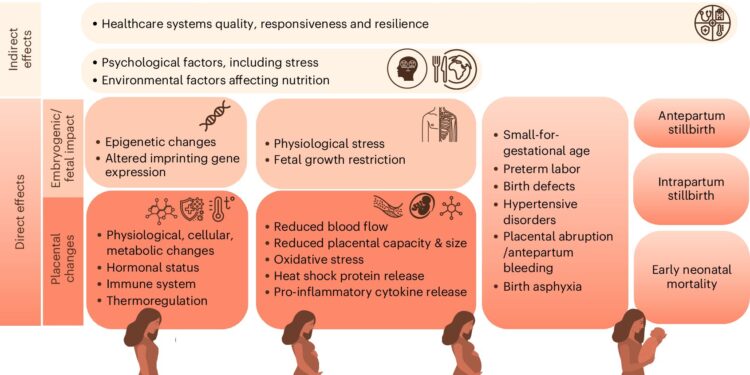Hypotheses on the physiological, environmental, and health pathways of the effect of extreme heat on perinatal outcomes. Credit: Natural medicine (2024).
Heatwaves in sub-Saharan Africa are expected to become more frequent due to climate change, according to a new study by researchers at Karolinska Institutet and others, published in Natural medicinereveals a worrying correlation between high temperatures during the last week of pregnancy and an increased risk of stillbirth and early neonatal mortality.
“As temperatures rise in sub-Saharan Africa, knowledge about how they affect pregnant women and their babies is limited,” says the study’s corresponding author, Claudia Hanson, professor in the Department of Global Public Health at Karolinska Institutet in Sweden.
“Our findings indicate that maternal and newborn care in this region needs to be improved to ensure that hard-won gains in reducing mortality are not lost due to climate change,” adds Andrea Pembe, professor in the Department of Obstetrics and Gynecology at Muhimbili University of Health and Allied Sciences in Tanzania.
The study included more than 138,000 births in 16 hospitals in four sub-Saharan African countries: Benin, Malawi, Tanzania and Uganda. The researchers analyzed the association between high temperatures in the week before birth and perinatal mortality, which is death just before, during or within 24 hours of birth.
High temperatures were defined as an increase in the average weekly temperature from a generally warm week (between 22 and 28°C depending on the country, corresponding to the 75th percentile) to an exceptionally warm week (between 24 and 29°C, corresponding to the 99th percentile).
Babies whose mothers were exposed to high temperatures in the week before giving birth had a 34% higher risk of perinatal death, a risk that doubled during the hottest six months of the year. Unlike in many other countries, a large proportion (nearly half) of stillbirths occurred during childbirth.
“Our study shows that there is an urgent need to develop and implement interventions that protect pregnant women and their babies during heat waves,” says Jeroen de Bont, co-lead author and postdoctoral researcher in Petter Ljungman’s research group at the Institute of Environmental Medicine at Karolinska Institutet.
In subanalyses of heat-associated mortality by timing of death (before, during, or after labor), researchers observed trends toward increasing stillbirths during labor, but not all estimates reached statistical significance.
The next phase of research should focus on redesigning maternity wards to mitigate the effects of heat on pregnant women and staff, including using improved construction techniques such as insulating ceilings and creating adjacent green spaces, which may provide additional health benefits.
Researchers will also study how heat affects other maternal and birth outcomes, and how it interacts with environmental factors such as air pollution.
More information:
Claudia Hanson et al., A time-stratified case-crossover study of heat exposure and perinatal mortality in 16 sub-Saharan African hospitals, Natural medicine (2024). DOI: 10.1038/s41591-024-03245-7
Provided by the Karolinska Institute
Quote:Rising temperatures in Africa could increase perinatal deaths (2024, September 3) retrieved September 3, 2024 from
This document is subject to copyright. Apart from any fair dealing for the purpose of private study or research, no part may be reproduced without written permission. The content is provided for informational purposes only.



